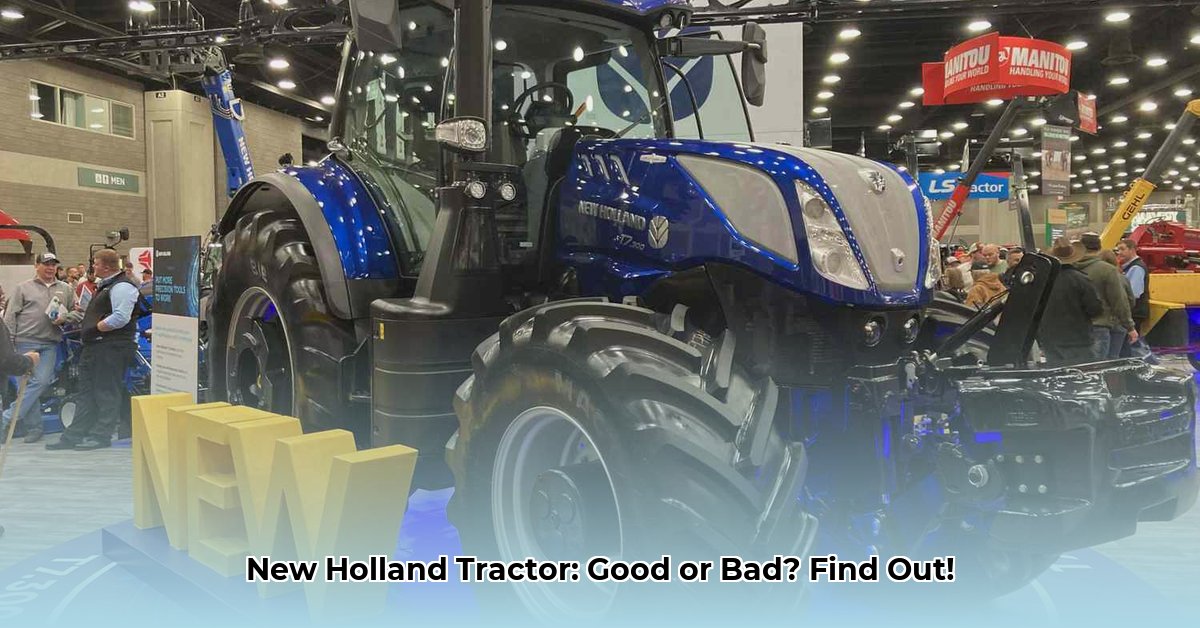
Choosing the right tractor is a critical investment for any farmer. This comprehensive review examines New Holland tractors, weighing their strengths and weaknesses to help you make an informed decision. We'll explore their reliability, compare them to competitors, and provide a practical buying guide. By the end, you'll be equipped to select a tractor perfectly suited to your farm's needs. For the best deals, check out these New Holland packages.
Strengths of New Holland Tractors: Dependability and Versatility
New Holland boasts a strong reputation for building durable and long-lasting tractors. Numerous user testimonials highlight their reliability, with many reporting years of trouble-free operation even under demanding conditions. This translates into a significant advantage: strong resale value. A well-maintained New Holland tractor often retains its value better than some competitors, mitigating long-term costs.
Beyond durability, New Holland excels in versatility. Their extensive model range caters to a broad spectrum of farming operations. From compact tractors ideal for smaller farms and specialized tasks to powerful models suited for large-scale agriculture, New Holland provides options to fit diverse needs. This adaptability makes them a compelling choice for farmers of all sizes.
Did you know that New Holland offers models specifically engineered for vineyard work, showcasing their commitment to specialized agricultural needs?
Weaknesses of New Holland Tractors: Addressing Maintenance and Complexity
While New Holland tractors are generally reliable, some users report higher-than-expected maintenance costs and operational complexity. These issues are not uniform across all models. Thorough research, focusing on specific models and reading user reviews, is vital. For example, some users report issues with specific hydraulic systems in certain model ranges, while others find the control interfaces of particular models less intuitive than those on competitors' machines.
"I've owned my New Holland for five years and have been pleasantly surprised by its durability. However, the cost of routine maintenance sometimes feels unexpectedly high," says John Miller, Owner of Miller Family Farms.
It's crucial to interpret reviews critically by considering the context and potential bias of the source. Always investigate multiple sources of information before reaching a conclusion.
What percentage of New Holland owners report maintenance costs exceeding their initial projections? A thorough data analysis is needed to answer this question accurately.
Model-Specific Considerations: Matching Tractor to Operation
Choosing the correct New Holland model is crucial. Consider factors such as:
- Farm size: Small farms may benefit from compact models, while large operations might need powerful, high-horsepower tractors.
- Tasks: Specific tasks determine engine horsepower, transmission type (powershift vs. hydrostatic), and hydraulic system capabilities. Vineyard work, for instance, requires significantly different specifications than large-scale grain harvesting.
- Budget: Factor in purchase price, ongoing maintenance, fuel efficiency, and potential repair costs.
Your New Holland Tractor Buying Guide: A Step-by-Step Approach
- Budgeting: Develop a comprehensive budget encompassing purchase price, annual maintenance (oil changes, filters, etc.), potential repairs, and fuel costs. Research average maintenance expenses for your chosen models.
- Dealer Network: Prioritize a reputable local dealer with a strong track record of service, parts availability, and responsiveness. Check online reviews and compare dealers before making a decision.
- Warranty Options: Explore extended warranty options to limit financial risks associated with unexpected repairs. Carefully weigh the added cost against potential long-term savings.
- Test Drives: Test drive multiple models. Spend time operating each tractor, assessing its controls, responsiveness, and suitability for your specific tasks.
- Specifications: Understand key specifications—engine horsepower, fuel efficiency, transmission type, and hydraulic system capacity—as these directly impact both performance and costs.
Maintenance and Repair: Extending Tractor Lifespan
Proactive maintenance is essential for minimizing repair costs and maximizing your tractor's lifespan. Adhere to the manufacturer's recommended service schedule; clean the tractor regularly; store it properly (protected from the elements); and address minor issues promptly to prevent escalating problems. Investing in operator training also minimizes wear-and-tear and prolongs the life of your equipment.
Conclusion: Making the Right Choice
Determining if a New Holland tractor is “good” depends entirely on individual needs and circumstances. This detailed review aims to equip you with the necessary information to make an informed decision. Meticulous research, a realistic budget, and careful consideration of dealer support are all critical. With thorough planning and due diligence, a New Holland tractor can be a valuable asset.